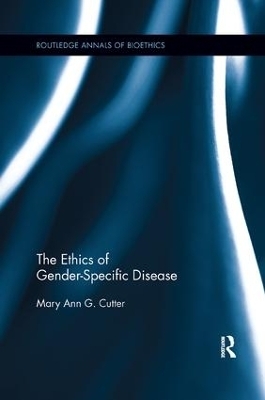
The Ethics of Gender-Specific Disease
Seiten
2017
Routledge (Verlag)
978-1-138-10759-5 (ISBN)
Routledge (Verlag)
978-1-138-10759-5 (ISBN)
Our understanding of gender carries significant bioethical implications. An errant account of gender-specific disease can lead to overgeneralizations, undergeneralizations, and misdiagnoses. It can also lead to problems in the structure of health-care delivery, the creation of policy, and the development of clinical curricula.
In this volume, Cutter argues that gender-specific disease and related bioethical discourses are philosophically integrative. Gender-specific disease is integrative because the descriptive roles of gender, disease, and their relation are inextricably tied to their prescriptive roles within frames of reference. An integrative account of gender-specific disease carries ethical implications because our understanding of gender-specific disease is evaluative, and our evaluations of gender-specific disease entail judgments concerning the praiseworthiness and blameworthiness of a clinical event. Cutter supports a "both/and" emphasis on context and integration in relation to gender-specific disease and bioethical analyses.
While the text mainly focuses on gender-specific diseases that affect women, Cutter also includes examples involving men, children, and members of the LGBT community.
In this volume, Cutter argues that gender-specific disease and related bioethical discourses are philosophically integrative. Gender-specific disease is integrative because the descriptive roles of gender, disease, and their relation are inextricably tied to their prescriptive roles within frames of reference. An integrative account of gender-specific disease carries ethical implications because our understanding of gender-specific disease is evaluative, and our evaluations of gender-specific disease entail judgments concerning the praiseworthiness and blameworthiness of a clinical event. Cutter supports a "both/and" emphasis on context and integration in relation to gender-specific disease and bioethical analyses.
While the text mainly focuses on gender-specific diseases that affect women, Cutter also includes examples involving men, children, and members of the LGBT community.
Mary Ann G. Cutter is Professor and Chair of the Department of Philosophy at the University of Colorado, Colorado Springs.
Selected Contents: 1. Background 2. Gender-Specific Disease: Descriptive Analysis 3. Gender-Specific Disease: Prescriptive Analysis 4. Gender-Specific Disease: Contextual Analysis 5. An Integrative Approach to Gender-Specific Disease 6. Rethinking Gender-Specific Disease Nomenclature and Taxonomies 7. Toward an Integrative Bioethics 8. Integrative Bioethics and Assessing Gender-Specific Disease 9. Implications for Health Care for Men, Children, and Members of the LGBT Communities 10. Some Lessons and Challenges 11. Concluding Reflections
| Erscheinungsdatum | 14.07.2017 |
|---|---|
| Reihe/Serie | Routledge Annals of Bioethics |
| Zusatzinfo | 1 Tables, black and white; 4 Line drawings, black and white; 5 Illustrations, black and white |
| Verlagsort | London |
| Sprache | englisch |
| Maße | 152 x 229 mm |
| Gewicht | 453 g |
| Themenwelt | Geisteswissenschaften ► Philosophie ► Ethik |
| Sozialwissenschaften ► Soziologie ► Gender Studies | |
| ISBN-10 | 1-138-10759-X / 113810759X |
| ISBN-13 | 978-1-138-10759-5 / 9781138107595 |
| Zustand | Neuware |
| Haben Sie eine Frage zum Produkt? |
Mehr entdecken
aus dem Bereich
aus dem Bereich
unsere kollektive Verantwortung
Buch | Hardcover (2023)
wbg Theiss in Wissenschaftliche Buchgesellschaft (WBG) (Verlag)
35,00 €


